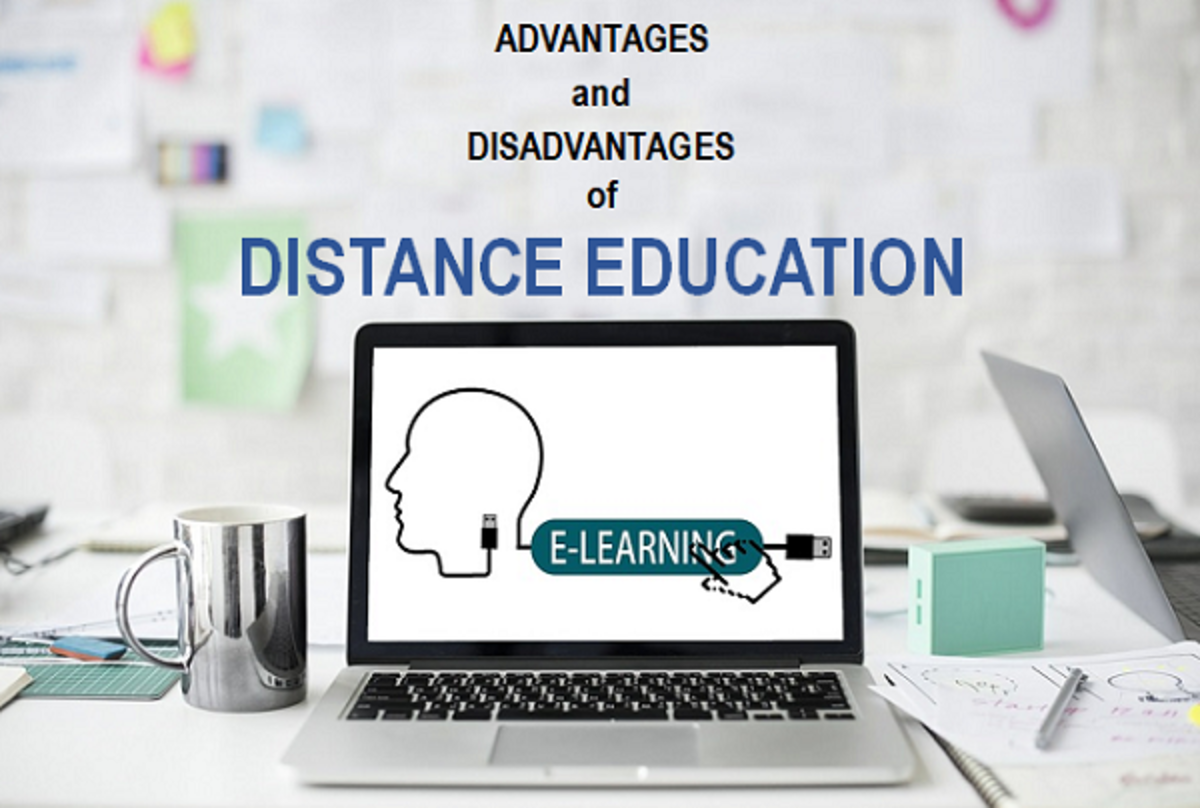Online Education: Pros and Cons

Check out my new book
I recently published by first book. It developed from teaching history at the community college level for eleven years. The link below will take you to a hub with more details, including links to where it can be bought.
The Case for "Hybrid" Courses
On Monday I will finally start teaching my sixth class of the current semester. It is a class with a unique format that I have taught several times over the years. We meet for the standard three hours per week, but it is only an eight-week course. So if you do the math, it comes out to half of the normal course hours. To make up for these lost hours, I am supposed to create activities that students complete online, hence the title, “Online Hybrid Course.” So far in my teaching career, this is the only type of online class that I have ever taught. Of course, many classes in my various community colleges, like colleges across the nation (and world), are completely online. Now while I am sure that there is some excellent online education happening out there, my feelings about this increasing trend are mixed. Call me old fashioned, but I think that the online hybrid concept may be superior to the idea of internet only. There is still something to be said for the face-to-face contact and interaction that can only happen in a “traditional” classroom.
Ever since web browsing became relatively easy for the average person, people have recognized the educational potential of this incredible technology. Initially, online education was simply a more efficient version of a correspondence course. Instead of getting and submitting assignments through the mail, this process could now happen electronically. But as high speed internet access became more commonplace and computers rapidly became more sophisticated, online education could now be much more than a glorified correspondence course. Anything that a student could experience in a classroom and learn from a textbook could easily happen online: videos, audio presentations, pictures, discussions, and seemingly infinite amounts of written information on any topic imaginable.
Internet courses also have several other advantages. Students with physical disabilities can take classes without struggling to get to the campus and into the classroom. The same can be said of students with work hours or family responsibilities that make it difficult to squeeze in classes at specified times. Internet courses can also save enormous amounts of money on campus infrastructure as fewer classrooms will need to be built and maintained, and savings can (theoretically) be passed on to students. Environmentalists, in fact, should be singing the praises of internet education. Think of all the greenhouse gas emissions that can be reduced when fewer people are clogging up streets as they drive to campus. Sure, all of those computers will be draining electric power, but most of us never turn the damn things off anyway.
There are limitations, however, to the internet as an educational tool. For one thing, certain fields require a certain amount of “hands-on” learning and lab work that cannot be simulated electronically. These include Biology, Chemistry, Engineering, Cosmetology, Nursing, Auto Repair and countless others. But even in more conceptual fields such as Philosophy, Literature, or History, going completely online can create some problems. Being something of a cynic, my biggest problem with purely online education is the added potential for two of the scourges of college education: academic dishonesty and flakiness. If there is no face-to-face contact between teacher and student, it is impossible to know if the student registered is the same person who did the actual work. And if a student has an inclination toward procrastination and general irresponsibility, the flexibility that online education provides can become a curse. Some people need the structure of a formal class meeting at a consistent time as a push toward self-discipline. Without a physical person holding them accountable to show up at a given place and time, they will slack off. Unfortunately, the same can be said for teachers. Internet teaching, like internet learning, can create the illusion that no one is watching. It can also be difficult for school administrators to determine if the teacher is putting in the amount of hours for which he or she is being paid. Years ago, I met a teacher who said that she was teaching an online hybrid class for the first time. When I asked her what she was doing for the online component, she basically said, “nothing.” Essentially, she was doing half of the work for all of the pay. Did the school eventually hold her accountable for this? I don’t have an answer, but you may be able to figure out what my guess would be.
It is also impossible to measure the value of face-to-face contact between teacher and student. A teacher, to a certain degree, is an individual who gives out assignments and shares information. These basic activities can easily be done on the internet, which places limitless resources at the teacher’s (and students’) disposal. A teacher, however, also communicates things that cannot be transmitted electronically. One of the most satisfying comments that I often get from students is that I am enthusiastic about my subject. They also often tell me that I am, if nothing else, good entertainment. “He’s funny” is probably the most common comment that I get on “rateyourprofessor.com” . In my mind, being entertaining and enthusiastic is as important as imparting valuable information. Students are going to forget most of the information that they are exposed to whether they get it from a teacher’s lecture, a web site, a textbook, or a “YouTube” video. A truly enthusiastic teacher, however, can light a fire in a student that sticks with him or her long after the class is over. A teacher more than anything needs to be a role model of what a student should be. If they see me having a great time interacting with this material and trying to make it understandable, they might be encouraged to do the same.
Students who learn exclusively online also miss out on one of the best parts of the college experience: interacting with other students. I often learned as much from study groups as I did from my teachers. Plus, listening to a variety of people sharing different points of view can cause you to reexamine your own assumptions. When I first taught a hybrid course, I asked myself what I could do with a course web site that I was not already doing in the classroom. I settled on one simple idea: student interaction. A course web site creates the potential for students to learn from each other. I therefore set up “chat rooms” where I ask a few questions from each unit where students can express their opinions on sometimes controversial questions. I also encourage them to (respectfully) discuss these issues and argue with one another, which a few of them really get into at times (and sometimes a little too much). In addition to these chat rooms, I have students post all of their written assignments on the web site so that other students can read them. This essentially becomes an electronic version of the class presentations that used to take up a lot of class time and often bore me to tears throughout my academic career. With the internet, students can read these “class presentations” at their own convenience, and they receive points when they respond with thoughtful comments. The course web site is essentially a classroom blog, or, if you prefer, a “Facebook” group page.
In a hybrid course, the internet becomes a supplemental tool to help students dig more deeply into certain topics. It does not replace student teacher interaction; it enhances it. For me, this is the real future of internet education. Of course, I have not taught fully online, so I am not in a position to judge what others are doing. A conscientious student can probably learn a lot in a purely online course from a conscientious teacher. Maybe I’m still teaching with one foot in the past. Maybe I am living under the delusion that students just need to hang out with me and experience my contagious charisma. If someone out there has more experience with online education, please share your insights. But be gentle. Old delusions die hard.







